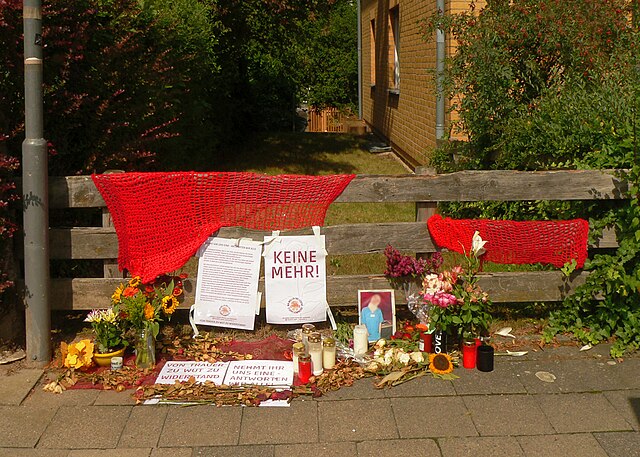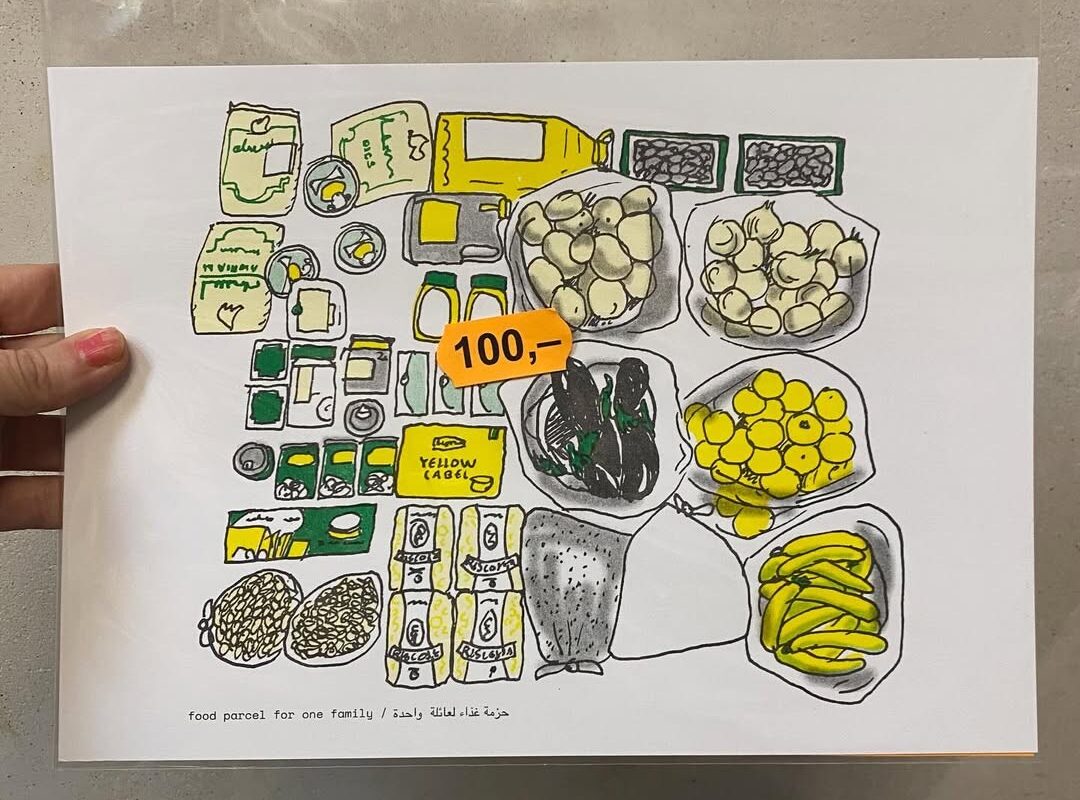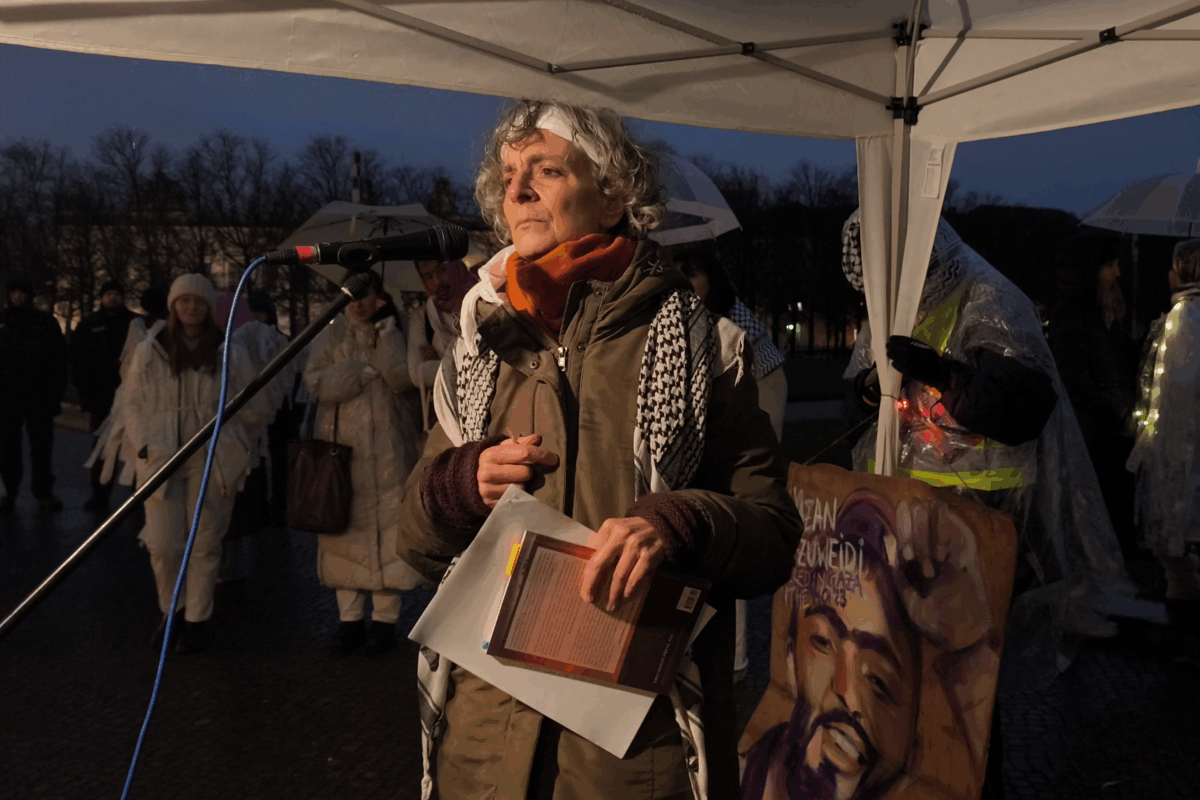Frédéric Valin interviews Jacinta Nandi
In The Worst Housewife in the World, you describe living with a man who considers himself to be too good for housework. He believes that it’s sufficient for him to bring money into the household. In the meantime, you have separated and are looking for an apartment. How is it going?
I’m a little surprised how difficult it is. I’m poor, but not super poor. But my earnings are always irregular, so nobody wants me! I think it’s great if I get 2000 Euros in a month; I really don’t know what I would do with 5000 Euros per month. Now I have a German alias which I use on the documents, so maybe that’ll help. But there’s something very interesting happening in the Facebook groups for single parents: a man offered a room, rent-free, 20 square meters, all you have to do is clean a little and look after the children from time to time. Offers like that are becoming more often. It’s as if people are organizing an au pair, but forever.
You have high praise for the Berlin model – it’s like the good witch who releases you from the dungeon of parental leave, you say. What is state support like now?
People always maintain that the greatest thing about Germany is that everyone here always receives help. But that isn’t true. Everyone at the government offices and counseling centers tells me, “Oh, your case is so complicated.” Can you believe that? Has there never been a case like mine – a freelancer with a low income and a husband who earns very well? The playgrounds are full of women like that – they all earn less than the man. Are they all still together? Germany is a very unfair country, but nobody talks about that. A three-room apartment currently costs 800 Euros without an accommodation entitlement certificate. How is that possible? And yet everyone here thinks it is so much fairer and better than in England. There are also things that are fairer, but not for women in partnerships. I wouldn’t have moved in with someone who has as much money as my ex if I’d have known that it would be such a prison. Now I think, whenever a woman sleeps with a man, she’s sleeping with the enemy.
How has the pandemic been for you so far?
I’ve lived in Germany for 20 years, and for 20 years my mom has said, “You’re on your own! In a foreign country!” My mom is a bit melodramatic. But since the pandemic, I know that she’s only exaggerating a little. So many friends got help from their relatives or went to their parents in the countryside. And then on Facebook I saw photos of my relatives meeting outside – that hurt me so much. My mom has MS; she’s in a risk group and to see her I would have to fly, so that won’t work. I realized that I really was alone here.
You’ve lived in Germany since 2000 and you’ve spent as much time in England as you have here. What are the differences?
Germany is less sexist, but more misogynous. There are a lot of people in Germany who think that I’m sexist because I say pussy and cunt and cock. I don’t get that. Or the erasure of racism: there’s nothing racist here, except measuring the heads of black people. And human zoos, maybe. Here, most people seem to believe that sexism doesn’t comprise oppression and that racism doesn’t exist. How often have I heard that human races don’t exist anyway, so there can be no racism? How stupid can you be?
The Germans are snobs who don’t act snobbish. Germany never talks about class or money. At the same time, everything is so standardized; you need the same hair color, the same skin color, you always have to shake your head a little when you speak and say “irgendwie” every three seconds – then you’re normal. You have to be as boring as possible here, so that in the end you’ve got no personality left. If everything’s grey – your face, your feelings, your thoughts – then you’re German.
German arrogance is different from the English brand. They think that the conditions in their country are far better than in other countries. But it’s simply shitty in a different way. Look at the NHS – everybody says that the British health system is totally screwed up. But if you don’t have money, it sucks in Germany, too. It’s perhaps even more democratic in England because it sucks for everyone.
Do you identify yourself as a woman of color?
In Germany, yes. In London, I’m nearly “white passing.” I’m a typical “mixed race” child. At the same time, it’s problematic to say that I’m a woman of color, because the racism I experience is not the same as other people do. I speak English, I’m from the UK. Ten years ago, people used to ask me if I was from Turkey and were always relieved when I answered “no.” Half-Indian half-English is a much better way to be a foreigner.
Nevertheless, I do experience racism. Everyone talks about energy and mindset and positive attitude and everything. But being a thin white woman just makes you so much more positive. You’re not constantly looked at with resentment and contempt.
What connects you with England, and what with Germany? Your father was born in India – do you have any connections there?
Sometimes I feel very British, and sometimes I feel very German. But I never feel Indian. There’s only a great sadness in my heart; something has been lost. Only the vague feeling of never belonging remains. People say I hate Germany, but I hate England, too, except for football. I especially hate this saccharine patriotism – always these landscapes, these idylls. In England, they all love cities whose names have “castle” in them.
It’s also often a question of class. There was an episode of Frauentausch – Frauentausch is, of course, misogynistic and classist and disgusting trash, but this episode is great. There was an English woman who was low-income and totally young, and she entered into a German middle-class family where everything was so perfect. And then she ate with the kids in front of the TV, chicken nuggets and stuff like that, and the husband asked her, “Why in front of the TV?” And she says, with complete confidence, “that’s why television exists.” Total culture clash. And then the German wife comes back and says, “Oh, I’ve seen now that I’ve done way too much, and that I don’t have any time for myself. I won’t be such a perfectionist anymore.” I cried, it was so beautiful.
You nearly got German citizenship before Brexit and you’ve been issued permanent residence here. It was a shock when the Brexiters won their referendum.
Yes, I’ve long underestimated how much white people hate non-white people. Racism is more important to many people than any values. And it was about racism. People constantly accuse me of hating white people, of hating men. But if I hated white people and hated men, I wouldn’t be so shocked and disappointed whenever something violent happened. I’m always disappointed by your bad behavior, so I originally thought you were better than you really are.
Is this British nationalism something new? In Germany, this wave is associated with the 2006 World Cup.
I’m totally a 90s Kid. In the 80s, I only saw Union Jacks on plastic flags stuck into sandcastles. Otherwise I never did. It was patriotism, of course, but super kitschy – nobody took it seriously. And then came Geri Halliwell with her Union Jack dress. She probably meant it to be a punk statement.
The idea of being allowed or having to be proud of one’s country came up. At the European Championship in 1996, you suddenly saw the Saint George’s Cross everywhere – it didn’t exist before. And now the English are crazy about the Union Jack and the English flag. Sometimes I think Geri Halliwell is a bit to blame for Brexit.
What about the left in England? Are there differences to the left here?
I often find the left in England so beautifully naive and hopeful. Here, you can be totally left-wing and at the same time totally racist and sexist. Being left-wing in Britain always means being a bit nice to minorities. Germany is much more cynical. That’s interesting, but it’s also depressing. I mean, the Berlin non-white cab driver who’s got a house is immediately part of some elite here, and the East German cab driver who’s got a house has been left behind. I am constantly being told that I belong to some elite, even in debates about “cancel culture.” So, yes, I know I’m very clever, but that’s not my fault. People’s imaginations are running wild at the moment in a way that has nothing to do with reality.
At the very end, you write how you finished the book: everyone was constantly ill, and the book sat on your shoulder like an ugly toad.
Now I think this book wrote itself. But I only think that because it’s finished. Luckily the memory of the pain disappears quickly. It was really easy for me. And then the pandemic came. I was almost finished and actually there were a lot of stories that I wanted to write, but there was no time left. I took a weekend and got a lot of Red Bull and wrote, and didn’t sleep. After that I was completely shattered. In the pandemic, I wrote completely different stories, and also wrote much less. The daycare centers were closed, and it was impossible to write when my child was at home.
Do you truly hate housework?
I actually enjoy housework when I have time. I just hate loading and unloading the dishwasher. I like doing the dishes. There are also a few things I don’t know how I feel about because I don’t do them – like folding clothes, for example. The problem is not the housework, the problem is that there’s no time for it. When are you supposed to do all of it?
You’ve been performed a lot at reading events. German humor is considered very unfunny, but British humor very funny.
I often find Germans very funny. The biggest difference is that an Englishman wants to be funny all the time. Charming. A German man is often ashamed if he wants to be funny. Maybe that’s why Germans like to watch Mr Bean – because he’s so uninhibited. In England, this is a kids’ show. But it’s better than Mario Barth.
When it comes to entertainment, we’re experiencing a backlash. There are more and more series that idolize the police. And there are more and more upper-class people with such saccharine portrayals. At the same time, we’re making progress. When I was fourteen, a man put his hand up my skirt and I came home and told this story and my parents were totally shocked and sad and made me a cup of tea. But it never occurred to anyone to call this a crime.
The so-called tolerance paradox is like this: the more you talk about a problem, the bigger it appears to be. But talking about it can also be part of the solution.
Yes. In England, inequality used to be much more obvious. Princess Diana, for example, that’s my mother’s generation, had no education. Back then they were supposed to do a little schooling, and then work and then marry. And Germany was much more racist when I arrived here in 2000. I was giving classes back then, and the teachers laughed when they saw my recommendations for Afghan children to attend a university track high school. “They’re Arabs,” they said. I’m sure they still talk like that today, but there are more PoCs around who know that that’s not okay. And who say so.
But sometimes I get depressed at how much resistance there is. Sometimes it seems so hopeless. I also think that it’s nonsense to always talk about bubbles in terms of social media. You used to be able to be friends with people for 20 years before you found out that they actually think black people have smaller brains than white people. You used to like someone and then suddenly think, “Is he racist? Shit, my new buddy is racist!” Now you look at his wall and you know immediately.
More and more people are coming out as discriminatory. JK Rowling, for example, makes no secret of her transphobia. Nevertheless, Harry Potter appears in your stories from time to time.
Harry Potter is my vintage. But I didn’t read those books as a teenager, I thought it was so one-dimensional and I didn’t want to read any more kids’ books – it was a bit snobbish of me. The narrative is so controlled; it’s unimaginative, really, like Enid Blyton or Agatha Christie. The characters are rather stereotypical. I mean, Harry Potter loses his temper maybe once in all of the books. Actually, he’s toxic. But then my son begged me to read it to him, and then I was totally into it. It was one of the nicest times for me as a mother when we read this together. Sometimes we set the alarm an hour earlier and read another chapter before school. At the end I always included Princess Diana, so everyone cried because she died. It fit so well. All in all, I’m really sad that JK Rowling hates transwomen so much.
I also find it interesting that more and more people are hiding behind improper speech; that is, saying racist or sexist or even unprofessional things and then pretending that it’s all just a performance, just a role.
I listened to the two minutes of Serdar Somuncu, and it was just painful. Actually, I thought that nothing could hurt anymore after even Donald Trump said, “Grab ’em by the pussy,” and got away with it. There are no more taboos. Everyone’s always talking about outrage, but I find it first and foremost just sad. We don’t talk about sadness, only about outrage. Because outrage is so easy to ignore. At the same time, there’s something liberating about outrage. If you feel outraged, then at least you do something and don’t sink into a depression.
What is something good about Germany, from the perspective of a feminist housewife?
Abendbrot (cold supper) is great. German women always say, “I’m such a great housewife,” and then they give their children bread and two slices of cheese to eat in the evening. Those lazy bitches. Cold supper is a clever German invention.
Jacinta Nandi was born in 1980 in London and has lived in Berlin since 2000. This article first appeared in German in nd. Reproduced with the authors’ permission. Translation: Emily Pollak.
Jacinta Nandi: The Worst Housewife in the World. A field Report and Manifesto. Edition Nautilus, 208 p., paperback, 16€.



